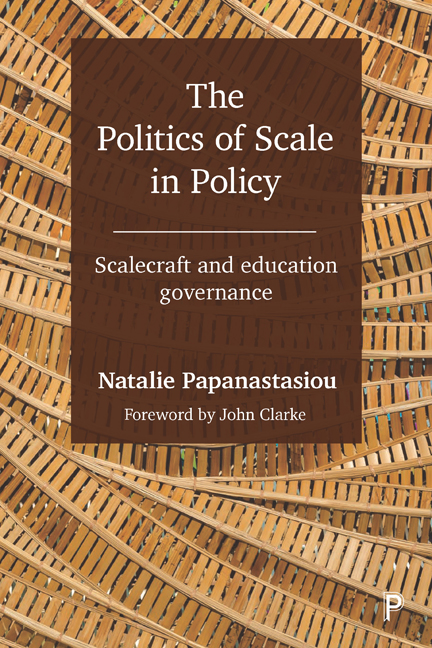Book contents
- Frontmatter
- Contents
- About the author
- Foreword
- Preface and acknowledgements
- 1 Policy, scale and the importance of space
- 2 Problematising scale in the study of policy
- 3 Exposing scale hegemonies
- 4 Knowledge, policy and scale
- 5 Hegemonies of statecraft and scale
- 6 Spatial entrepreneurs and scalecraft
- 7 The practice of scalecraft
- References
- Index
1 - Policy, scale and the importance of space
Published online by Cambridge University Press: 27 April 2022
- Frontmatter
- Contents
- About the author
- Foreword
- Preface and acknowledgements
- 1 Policy, scale and the importance of space
- 2 Problematising scale in the study of policy
- 3 Exposing scale hegemonies
- 4 Knowledge, policy and scale
- 5 Hegemonies of statecraft and scale
- 6 Spatial entrepreneurs and scalecraft
- 7 The practice of scalecraft
- References
- Index
Summary
Succeeding in the art of policymaking in contemporary politics involves designing policies which reflect the deeply interconnected nature of political space. And yet, while the fluid and networked nature of political space is undisputed, policy continues to be articulated through the age-old categories and hierarchies of scale. Indeed, it is difficult to understate the importance of scale for giving order and clarity to our understandings of policy. If we were for a moment to imagine a world without the vocabularies and metaphors of scale, thereby eliminating categories such as the local, national, or global, we would quickly find our abilities of expression and comprehension to be profoundly stunted. For social scientists, dichotomies such as ‘micro versus macro’, ‘local versus global’, and ‘bottom-up versus top-down’ reflect how metaphors and categories of scale remain at the heart of social inquiry.
This book asks why scale occupies this enduring position of privilege in the work of policymaking. By highlighting how scales are far from ‘natural’ features of policy and that they are instead essential to the armoury of policy practice, the book presents ‘scalecraft’ as a new dimension of policymaking. Engaging with diverse empirical material enables the book to not only demonstrate the importance of scalecraft but to also build on understandings of how hegemony is produced, challenged and sustained.
The book explores its central puzzle by adopting a cross-disciplinary theoretical lens which integrates critical studies of policy with political geography. This opening chapter establishes why such a crossdisciplinary lens is necessary to understanding the politics of scale in policy. Specifically, the chapter argues that for policy studies to critically engage with scale as a political concept, the study of policy needs to engage in a cross-disciplinary dialogue with human geography literature on ‘space’. The chapter demonstrates that a space-sensitive approach to policy analysis would involve being receptive to the idea that spatial concepts and categories are crucial to shaping the practices of policymaking.
The discussion which follows introduces what the study of space implies for the interests of social scientists, suggests a number of issues which have contributed to the lack of engagement with space in the field of policy studies, and then turns to describing the exciting potential for theoretical engagement with space for enriching understandings of politics and policy.
- Type
- Chapter
- Information
- The Politics of Scale in PolicyScalecraft and Education Governance, pp. 1 - 14Publisher: Bristol University PressPrint publication year: 2019

